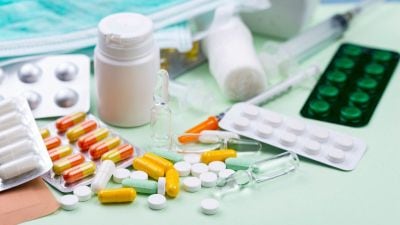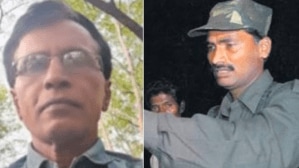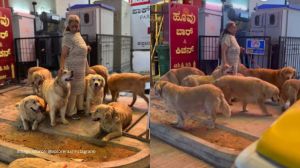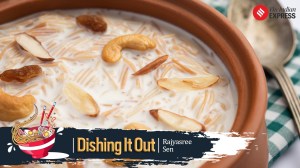As Pakistan votes to elect new govt, security stepped up, borders with Afghanistan and Iran shut
At least 30 people were killed and more than 40 others injured in twin blasts targeting election offices in Balochistan province, a day before the general elections.
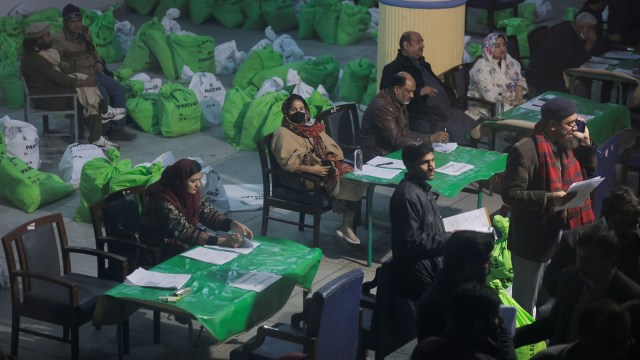 Members of the election commission work to distribute materials for the general election in Lahore, Pakistan. (Reuters)
Members of the election commission work to distribute materials for the general election in Lahore, Pakistan. (Reuters)As the coup-prone, cash-strapped Pakistan votes on Friday (February 8), former prime minister Nawaz Sharif’s Pakistan Muslim League-Nawaz (PML-N), jailed ex-premier Imran Khan’s Pakistan Tehreek-e-Insaaf (PTI) and Bilawal Bhutto Zardari’s Pakistan People’s Party (PPP) will enter a three-cornered but likely skewed contest.
Nearly 650,000 police, civil armed forces and armed forces have been deployed across the country as security concerns are amplified by the twin blasts at election offices in Balochistan on polling eve, which claimed at least 30 lives and injured over 40.
Pakistan election in numbers
More than 12.85 crore registered voters are slated to cast their ballot at over 90,000 polling stations in the general elections. The Election Commission of Pakistan (ECP) said 29,985 polling stations have been declared “sensitive”, and 16,766 as “highly sensitive”. Further, hospitals in Islamabad have been put on high alert till February 9 to avoid any untoward situation, ARY News reported. Consultants, surgeons, and CMOs of federal hospitals have been directed to remain on-call.
On Thursday, polling will begin at 8 am and continue without any interval till 5 pm. A countrywide public holiday has been declared to enable voters to cast their vote without any hindrance.
Punjab province has the most number of registered voters at 73, 207,896 followed by Sindh (26,994,769), Khyber Pakhtunkhwa (21,928,119), Balochistan (5,371,947) and Federal Capital Islamabad (1,083,029).
According to ECP, a total of 5,121 candidates are in the race for the National Assembly seats — 4,807 males, 312 females and two transgenders. For the four provincial assemblies, 12,695 candidates are in the field — 12,123 males, 570 females and two transgenders.
Who is in the race?
With former prime minister Imran Khan in jail, Nawaz Sharif’s Pakistan Muslim League-Nawaz (PML-N) is tipped to emerge as the single-largest party in the elections. Sharif, 74, will be eying the premiership for a record fourth time.
Pakistan Tehreek-e-Insaf (PTI) candidates are contesting the polls independently after the Supreme Court upheld the decision of the election commission to deprive Imran Khan’s party of its iconic election symbol the ‘cricket bat’. Khan, in a message from jail, earlier urged his supporters to wait outside polling booths after casting their votes. “Encourage the maximum number of people to vote, wait at the polling station… and then stay peacefully outside the Returning Officer’s office until the final results are announced,” said Khan on social media platform X.
The contest also involves the Pakistan Peoples Party (PPP) of Bilawal Bhutto-Zardari, who has been declared as the party’s prime minister face. The former foreign minister and son of assassinated prime minister Benazir Bhutto criticised opponents, including Sharif, for what he described as compromising the country’s security and economy during their tenures.
Imran Khan’s PTI alleges ‘worst-ever political engineering’; military denies interference
PTI spokesperson Raoof Hasan has said that the country is witnessing the worst-ever political engineering in the history of Pakistan to keep Khan’s party from winning the polls. “It has been by all means is the worst ever political engineering through all phases of the elections to keep the PTI out of the election process and achieve the desired result,” Hasan was quoted as saying by news agency PTI.
“A reign of terror has been unleashed on the party for the past 22 months under the ‘London Plan’ to dismantle PTI and remove its founding chairman Imran Khan from the political scene,” Hasan said.
Khan and his party have alleged that there is no level-playing field in the ongoing election process. The PTI leader has also blamed the powerful military establishment for preventing him from riding back to power.
The election body has stripped Khan’s party of the iconic ‘cricket bat’ as the election symbol, rejected his nomination papers and those of other party leaders, at least one of his party leaders has been killed during poll-related violence and in the latest, a key candidate from Lahore has been indicted in a terrorism case. Khan is in prison and with four criminal convictions so far, three of them handed down last week, he is barred from running in elections or holding public office. He has been sentenced to three, 10, 14 and seven years, to be served concurrently, and has more than 150 other legal cases pending against him.
Meanwhile, in a country where the military’s powerful backing has often accompanied a leader’s rise to power, the military denied any interference in politics.
Women in Pakistan elections
Prominent rights bodies have expressed dismay over the failure of major political parties to allocate at least five per cent of their party candidates for women on general seats. The Human Rights Commission of Pakistan (HRCP) in a statement on X advocated for a minimum requirement of women representation, with parties urged to take affirmative action to ensure that at least one-third of their candidates for general seats are women. “In principle, this should be a minimum requirement, with parties taking affirmative action to ensure that at least a third of their candidates for general seats are women,” the HRCP, an independent rights body, said.
Meanwhile, history will be made if Dr Saveera Parkash, a medical graduate based in Khyber Pakhtunkhwa’s Buner district, is elected from the general seat of PK-25. Saveera is the general secretary of PPP’s women’s wing in Buner and her father Dr Oam Parkash has been a member of PPP for over three decades, said a Dawn report.
Internet cuts, social media campaigns
The Pakistan Telecommunication Authority (PTA), the telecom regulator, rejected rumours that internet services would be cut off on the day of election.
Social media played a key role in generating a vote bank for the mainstream national parties. Mainstream political entities such as Pakistan Muslim League-Nawaz (PML-N), Pakistan Peoples Party (PPP), Jamiat Ulema-e-Islam Pakistan (JUIF), Awami National Party (ANP), and Jamaat-e-Islami (JI), popular as Jamaat, have also developed their social media contacts for the first time for coming general elections.
Amir Shahzad, a member of PTI’s social media team, told this correspondent that the party realised the importance of social media much before any other party in Pakistan and how, Khan already being a celebrity helped. “His messages on social media spread like wildfire, which successfully tarnished the reputation of all other leaders,” he said.
What happens when the results come in?
The National Assembly consists of 336 seats – 266 are decided through direct voting on polling day, while 70 reserved seats – 60 for women and 10 for non-Muslims – are allotted according to the strength of each party in the house. Victorious candidates become members of the National Assembly. Independent candidates have the option to join any party after the elections.
Once constituted, the National Assembly holds a parliamentary vote to select a leader of the house, who becomes the prime minister. A successful candidate must show a simple majority in the house – that is, the support of at least 169 members. Once a prime ministerial candidate wins the vote in the National Assembly, they are sworn in as prime minister. The new prime minister picks cabinet ministers, who form the federal government.
A similar process is followed at the provincial level to pick a chief minister and a provincial government.
What is in store for the winner?
Whoever wins the February 8 polls will find a daunting task ahead due to the dwindling economy and deteriorating security situation. Pakistan has been relying on bailouts to prop up its foreign exchange reserves and avoid default, with the International Monetary Fund and wealthy allies like China and Saudi Arabia financing the country to the tune of billions of dollars. Pakistanis grapple with a soaring cost of living, enduring gas outages overnight and hours-long electricity blackouts.
Pakistan’s more than two decades old fight against terrorism is also unraveling as the rebels have resurged since 2021 after the Afghan Taliban came to power. The new government will find it tougher to deal with the militancy by the banned Tehreek-i-Taliban Pakistan and Baloch nationalists.
Colourful trucks missing this poll season
Colourful trucks with paintings of political leaders that once dotted Pakistan’s roads and highways ahead of elections are missing this poll season, replaced mostly by posters and banners.
Kaleidoscopic murals of flowers, Islamic motifs, calligraphy, snow-capped Himalayan peaks, local mosques and popular figures are renowned examples of Pakistani truck art. “We used to do good business during the elections in the past but people are not coming to us any more. In the entire election campaign, only a single vehicle was brought to us for Imran Khan’s painting and then nobody came to us,” said Shakeel Ahmad, who has been painting trucks for the last 18 years in Peshawar.
Paintings of former Prime Minister Imran Khan continue to be seen on some trucks, despite the jailed popular leader being barred by a court last year from holding political office.
 Sohail Ghuri, 40, a truck art painter, paints a portrait of former Pakistan Prime Minister Imran Khan on wooden planks of a truck at a workshop in Peshawar. (Reuters)
Sohail Ghuri, 40, a truck art painter, paints a portrait of former Pakistan Prime Minister Imran Khan on wooden planks of a truck at a workshop in Peshawar. (Reuters)
With inputs from agencies






- 01
- 02
- 03
- 04
- 05


